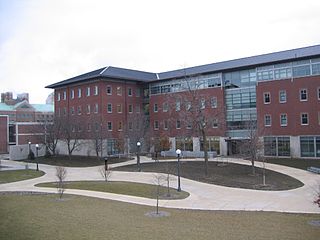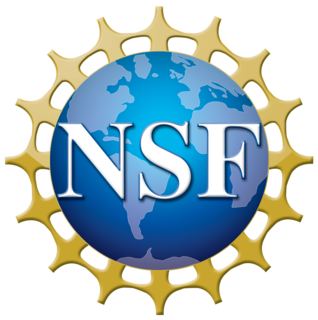
The National Center for Supercomputing Applications (NCSA) is a state-federal partnership to develop and deploy national-scale cyberinfrastructure that advances research, science and engineering based in the United States of America. NCSA operates as a unit of the University of Illinois at Urbana–Champaign, and provides high-performance computing resources to researchers across the country. Support for NCSA comes from the National Science Foundation, the state of Illinois, the University of Illinois, business and industry partners, and other federal agencies.

The National Science Foundation (NSF) is an independent agency of the United States government that supports fundamental research and education in all the non-medical fields of science and engineering. Its medical counterpart is the National Institutes of Health. With an annual budget of about US$7.8 billion, the NSF funds approximately 24% of all federally supported basic research conducted by the United States' colleges and universities. In some fields, such as mathematics, computer science, economics, and the social sciences, the NSF is the major source of federal backing.

Argonne National Laboratory is a science and engineering research national laboratory operated by the University of Chicago Argonne LLC for the United States Department of Energy located in Lemont, Illinois, outside Chicago. It is the largest national laboratory by size and scope in the Midwest.

Northeastern University is a private research university in Boston, Massachusetts, established in 1898. It is categorized as an R1 institution by the Carnegie Classification of Institutions of Higher Education. The university offers undergraduate and graduate programs on its main campus in Boston. The university has satellite campuses in Charlotte, North Carolina; Seattle, Washington; San Jose, California; Toronto, Vancouver, and Portland, Maine that exclusively offer graduate degrees. In 2019, Northeastern purchased the New College of the Humanities in London, England. The university's enrollment is approximately 18,000 undergraduate students and 8,000 graduate students.

The Molecular Foundry is a nanoscience user facility located at the Lawrence Berkeley National Laboratory in Berkeley, California, and is one of five Nanoscale Science Research Centers sponsored by the United States Department of Energy. The Molecular Foundry provides users from around the world with access to cutting-edge nanoscience expertise and instrumentation in a collaborative, multidisciplinary environment.
Grants are non-repayable funds or products disbursed or given by one party, often a government department, corporation, foundation or trust, to a recipient, often a nonprofit entity, educational institution, business or an individual. In order to receive a grant, some form of "Grant Writing" often referred to as either a proposal or an application is required.

The National High Magnetic Field Laboratory (MagLab) is a facility at Florida State University, the University of Florida, and Los Alamos National Laboratory in New Mexico, that performs magnetic field research in physics, biology, bioengineering, chemistry, geochemistry, biochemistry. It is the only such facility in the US, and is among nine worldwide. The lab is supported by the National Science Foundation and the state of Florida, and works in collaboration with private industry.

The Eli and Edythe L. Broad Institute of MIT and Harvard, often referred to as the Broad Institute, is a biomedical and genomic research center located in Cambridge, Massachusetts, United States. The institute is independently governed and supported as a 501(c)(3) nonprofit research organization under the name Broad Institute Inc., and is partners with Massachusetts Institute of Technology, Harvard University, and the five Harvard teaching hospitals.

Cornelius (Neal) Francis Lane, is a U.S. physicist and Senior Fellow in Science and Technology Policy at Rice University's Baker Institute for Public Policy and Malcolm Gillis University Professor Emeritus of Physics and Astronomy Emeritus at Rice University in Houston, Texas.
Nanomanufacturing is both the production of nanoscaled materials, which can be powders or fluids, and the manufacturing of parts "bottom up" from nanoscaled materials or "top down" in smallest steps for high precision, used in several technologies such as laser ablation, etching and others. Nanomanufacturing differs from molecular manufacturing, which is the manufacture of complex, nanoscale structures by means of nonbiological mechanosynthesis.
Located in Cambridge, Massachusetts, the Institute for Global Innovation Management (IGIM) was founded in 2002 as a research institute affiliated with the College of Business Administration at Northeastern University. The Institute focuses on applied, practice-oriented research and manages a number of research, education and outreach activities to communicate with academic audiences, students and corporations. It is partially funded by the US National Science Foundation (NSF) for its research on the global challenges facing technology intensive companies.
The National Center for Ecological Analysis and Synthesis (NCEAS) is a research center at the University of California, Santa Barbara, in Santa Barbara, California. Better known by its acronym, NCEAS opened in May 1995. Funding for NCEAS is diverse and includes supporters such as the U.S. National Science Foundation, the State of California, and the University of California, Santa Barbara.
The Center for Probing the Nanoscale (CPN) at Stanford University was founded in 2004 by researchers from Stanford University and IBM. The center is one of the National Science Foundation (NSF) Nanoscale Science and Engineering Centers (NSEC). The goal of the center is to develop and apply novel nanoprobes that dramatically improve our capability to observe, manipulate, and control nanoscale objects and phenomena. Developed technology will be transferred to industry for commercial implementation. Nanoprobe development and applications are under way in five theme groups, focusing on Individual Nanomagnet Characterization, Nanoscale Magnetic Resonance Imaging, Nanoscale Electrical Imaging, Plasmonic Scanning Tunneling Microscopy and BioProbes.
Materials Research Science and Engineering Centers (MRSECs) are university based research centers supported by the MRSEC Program of the Division of Materials Research at the National Science Foundation (NSF). The centers support interdisciplinary and multidisciplinary research of fundamental and technological importance and integrate research with education. MRSECs require outstanding research quality, intellectual breadth, support for research infrastructure, and education outreach. MRSECs facilitate active collaborations between academic institutions, national laboratories, and industry, as well international collaborations.
The College of Engineering ("COE") is one of the nine colleges of Northeastern University in Boston, Massachusetts. The college offers Bachelor of Science ("BS"), Graduate Certificate ("Cert"), Master of Science ("MS"), and doctoral degrees in various Engineering fields, as well as undergraduate and graduate degrees in interdisciplinary, engineering-related fields. The college currently consists of
Ahmed A. Busnaina, Ph.D. is the William Lincoln Smith Chair Professor and Director of National Science Foundation’s Nanoscale Science and Engineering Center (NSEC) for High-rate Nanomanufacturing and the NSF Center for Nano and Microcontamination Control at Northeastern University, Boston, MA.

Rashid Bashir is Dean of The Grainger College of Engineering, Grainger Distinguished Chair in Engineering and Professor of Bioengineering, at the University of Illinois at Urbana-Champaign. He was the Executive Associate Dean and Chief Diversity Officer at the Carle-Illinois College of Medicine at UIUC. Previously, he was the Abel Bliss Professor of Engineering, Head of Department of Bioengineering, Director of the Micro and Nanotechnology Laboratory, and Co-Director of the campus-wide Center for Nanoscale Science and Technology, a "collaboratory" aimed at facilitating center grants and large initiatives around campus in the area of nanotechnology. Prior to joining UIUC, he was at Purdue University from 1998–2007 with faculty appointments in Electrical and Computer Engineering, and Bioengineering. From 1992 to 1998 he worked at National Semiconductor Corporation in Santa Clara, CA as Sr. Engineering Manager. He graduated with a PhD in Electrical Engineering from Purdue University in 1992. He has authored or co-authored over 240 journal papers, over 200 conference papers and conference abstracts, and over 120 invited talks, and has been granted 50 patents. He is an NSF Faculty Early Career Award winner and the 2012 IEEE EMBS Technical Achievement Award. He received the Pritzker Lecture Award from BMES in 2018. He is a fellow of IEEE, AIMBE, AAAS, BMES, RSC, APS, and NAI.
Nano manufacturing is both the production of nanoscaled materials, which can be powders or fluids, and the manufacturing of parts "bottom up" from nanoscaled materials or "top down" in smallest steps for high precision, used in several technologies such as laser ablation, etching and others. Nanomanufacturing differs from molecular manufacturing, which is the manufacture of complex, nanoscale structures by means of nonbiological mechanosynthesis.
Andres Jaramillo-Botero is a Colombian-American scientist and professor, working in Computational Chemical Physics, known for his contributions to first-principles based modeling, design and characterization of nanoscale materials and devices.
Deborah J. Jackson is an American physicist and program manager at the National Science Foundation. She was the first African American woman to receive a Ph.D in Physics from Stanford University. She is an expert on "electromagnetic phenomena" with a research and development career that spans the full range of the electromagnetic spectrum from materials studies using hard x-ray wavelengths, to nonlinear optics and spectroscopy in the near-infrared, to the fielding of radio frequency instrumentation on deep space missions such as Cassini and Mars Observer.